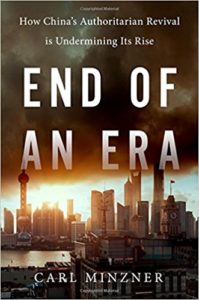China — The Trillion Dollar Question: How long can they have it both ways?
Answer: Not as long as it appears.
First, a confession. The PolicySmith was nearing completion of this essay that was to lay out the case for the erosion and eventual implosion of the China model. Recent developments there indicate a compelling case could and should be made that China is experiencing grave difficulties. The imminent move to abolish elections and install Xi Jinping as leader for life is deeply unsettling, both inside and outside of that nation.
Centrally planning food, water, energy, commerce, birth policy and the myriad other activities for a nation of nearly 1.4 billion souls is almost unthinkable. Add to that, controlling what that population sees, hears, is otherwise exposed to and policing and monitoring individuals, plus managing its international presence and relations while building its military – you get the idea that this unwieldy monstrosity has problems.
So, we were building our argument brick by brick when we encountered a book review – a review of a full-length book on that very subject! What the –?! Carl Minzner, Fordham University professor, has produced a definitive argument and exposition of China’s decline, which has already begun.
It is entitled “End of an Era: How China’s Authoritarian Revival Is Undermining Its Rise.”
It is highly recommended reading, though it does not explore the energy challenges China faces. That omission is the salvation of this essay, and will serve as a focus for its remainder.
But first a snapshot of China today by some numbers, then some chapter and verse on China’s pursuits before a dive into that nation’s energy challenges:
- China population 2018: approaching 1.4 billion with 1,960 born every hour, 1,126 deaths per hour. Men outnumber women roughly 2 to 1.
- Population elsewhere: India – 1.3 billion, USA – 325 million, Indonesia – 264 million, Pakistan 214 million, and Canada, our valued ally, harbors under 37 million citizens
- China produced 11 times more steel in 2010 than the U.S.
- There are more pigs in China than the next 43 pork-producing nations combined
- China set a new world record making and selling 29 million passenger and commercial vehicles in one year
- China controls 90% of the globe’s rare earth mineral reserves
- China manufactures 80% of wind and solar power equipment but installs only 5% of it
- Chinese people consume 50,000 cigarettes per minute
- The country possesses the fastest supercomputer in the world
The list is endless, with the fastest this, the largest reserves of that, ad infinitum. Those are incidental to China’s most intense focus — Artificial Intelligence. In Xinjiang, a region of unrest and dissent, surveillance techniques and AI are being field tested with the goal of virtually wall to wall records of individual activities and personal interactions.
The build up in military spending, expansion via island-building in the South China Sea, Artificial Intelligence investments, dropping the democracy/voting charade and the absence of meaningful energy resource development all point to tension and unease at the top of China’s government. Freedoms (actually modest reforms) granted common citizens by previous leadership are being pulled back. The top-down control and strictures sow discord and passive rebellion.
Reports out of China say that persecution of the Falun Gong spiritual movement has led to an underground resistance movement dedicated to the demise of the Communist Party. The long-standing birth control mandates have created skewed demographics between young and old and male and female.
The sheer depth and breadth of the state apparatus means local and regional officials’ fiefdoms are ripe for corruption, bribery is rampant and court verdicts are bought and sold. Unemployment is highest among college graduates who are reportedly four times more likely to be unemployed than their less educated brethren.
China’s devotion of resources to external influence and domestic repression, military and weapons erodes support, breeds unrest and continues the cycle of repression and enforcement. Government’s employs of its best and brightest to innovate in spying on citizens, advocates thievery of technology and fails in central planning schemes to the detriment of the greater good…China must even import rice.
Government spends lavishly on the window dressing of holding the Olympics, and touting its quality of life in videos is a constant. The optics on display in their propaganda pieces are appealing. These niceties mask the malevolence inherent in a growing China presence worldwide. China chooses the long game of incremental economic dominance backed by the spectre of force. Its growing presence in Europe in electricity transmission and generation and other venues are viewed with concern by the E.U. A prime example is an agreement signed last year by China and Czech Republic for projects worth 231 billion euros, according to The Weekly Standard, 2/12/18. That amount surpasses the Czech Republic’s annual GDP.
Last year German foreign minister Sigmar Gabriel told a group of French diplomats, “If we do not succeed…in developing a single strategy towards China, then China will succeed in dividing Europe.”
China has substantial oil and natural gas potential, but its focus is elsewhere. It has made modest moves such as an investment in coal to liquids and it has a strategic petroleum reserve. Scaling up a coal to liquids capability to meet any meaningful percentage of supply is a heavy lift even for China. Their SPR will be complete in 2020 with a 90 day supply at today’s rate of consumption.
China struts its technology, but its failures in oil and gas and disinterest in nuclear power are glaring. Its apparent dismissal of the lessons of energy supply – Hitler’s exhaustion of fuel supplies, the Arab oil embargo, the demise of the USSR due to low oil prices, et al – will haunt the Beijing government.
China’s energy poverty exacerbates Minzner’s overarching assertion on China’s leadership, “…have eroded the late twentieth century bedrock on which China’s success has been built. Rather than serving as the poster child for successful authoritarian government, China is actually an example of the perils of failing to undertake political reform.”
China has spent intensely on promoting itself on the world stage, yet the country has put a glossy sheen over deep institutional rot, particularly in the space where it desperately needs robust development – energy. It will be interesting to see China’s inevitable decline. The only question is not if, but when and how fast. Failure to develop one’s own energy resources, the backbone of all modern society, including ambitious and energy-intensive artificial intelligence programs in this case, is a daunting ticking clock. And how will the rest of the world respond when the downward spiral accelerates?


